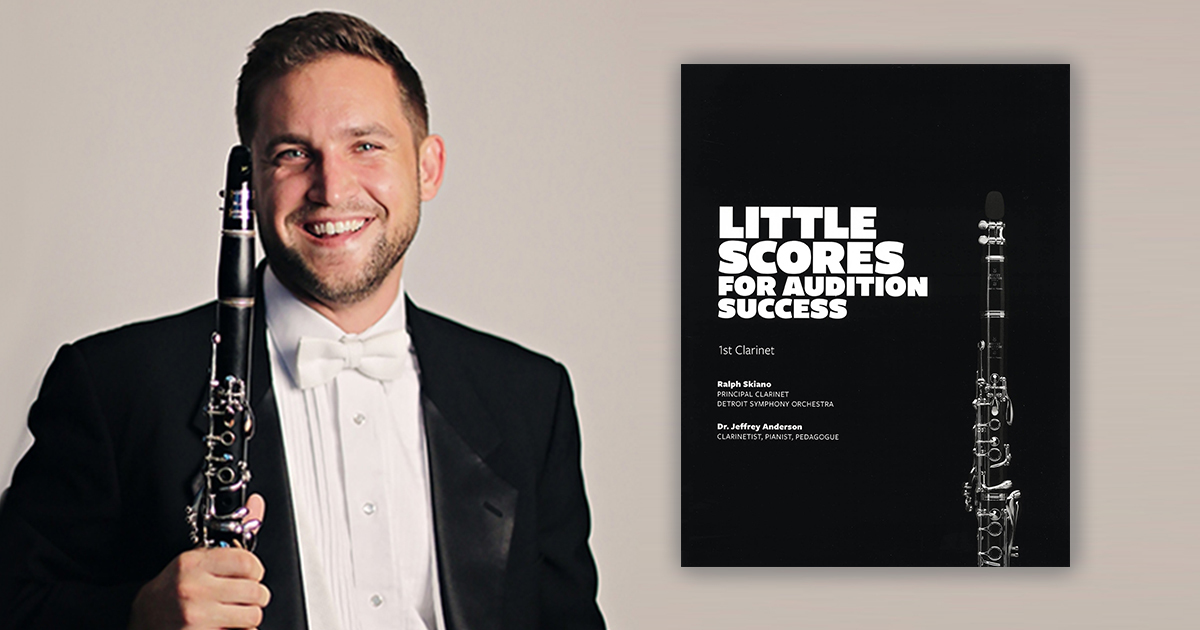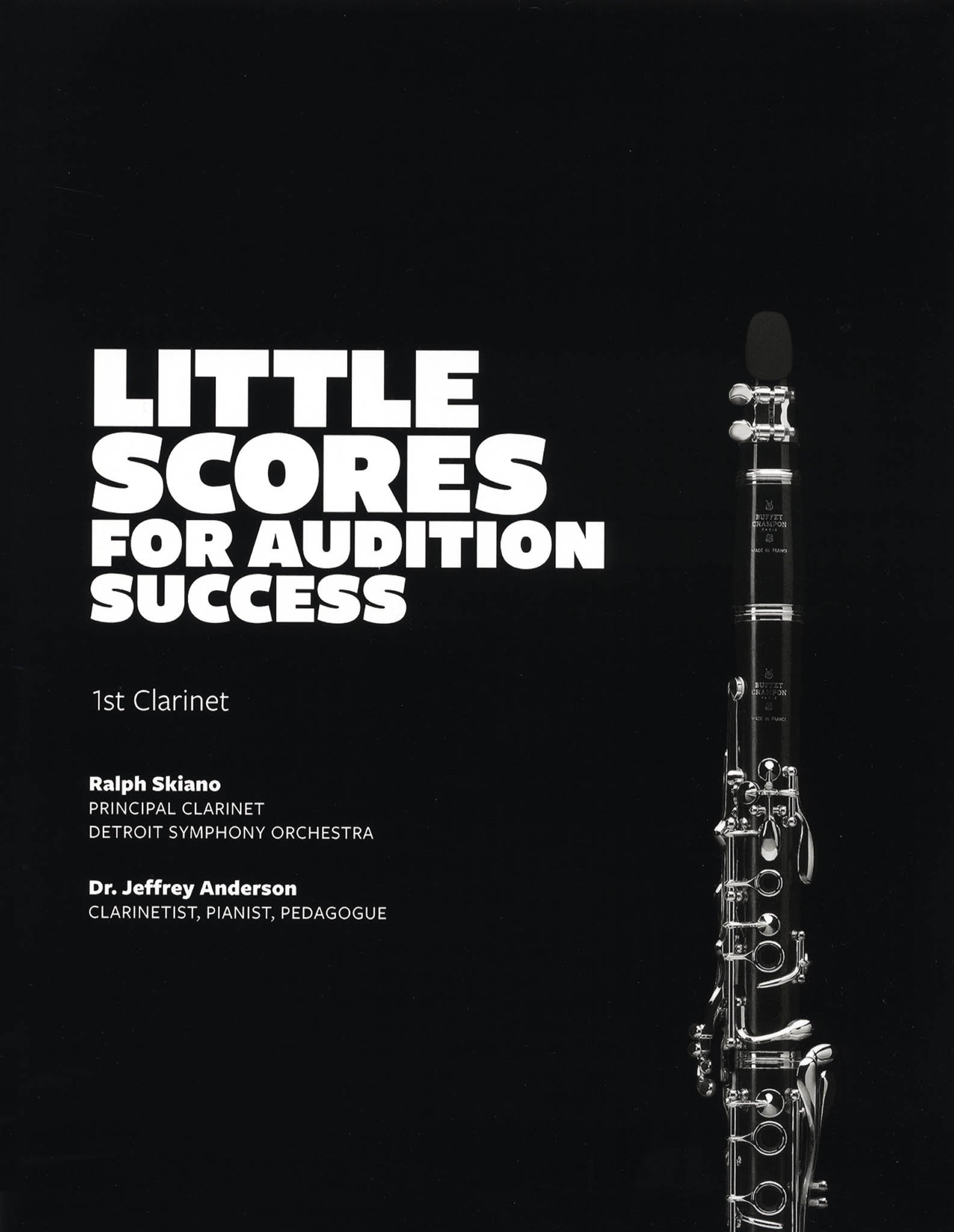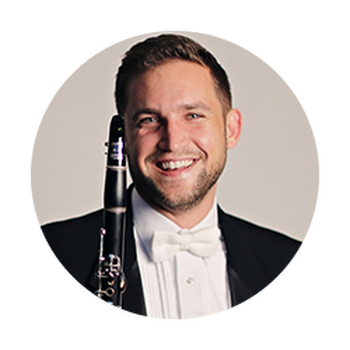Little Scores for Audition Success: Interactive Score Study for Orchestral Clarinetists
with Ralph Skiano
Date Posted: September 15, 2020

Interview conducted by David Gould, August 2020
Ralph, where did this super idea come from?
When I first started auditioning professionally, my teacher, Richie Hawley told me to “respond only to the music, not to the negative thoughts in your head”. I thought maybe the best way to get that music in my head was to listen obsessively to recordings, and so I did…every day, 3 times a day, I would listen through my list of excerpts.
Better still, I began devoting one practice day a week to playing ALONG with my favorite recordings while really imagining myself in the orchestra playing principal clarinet. This felt like it was going to give me an imaginary orchestra to play along with in my audition, but inevitably, the pressure and anxiety on audition day would make recalling the music harder than it had been at home.
I wanted the orchestra to be vivid and indelible, the way the music felt after rehearsing a piece at school for weeks in the orchestra or playing chamber music.
And so, I decided I would simply rehearse the WHOLE orchestra, rather than just playing one line. I created some simple arrangements, and voilà! After making multi-track recording and rehearsing with a metronome and drone, I was able to really internalize the music, the tempo, and the pitch in a much deeper way!
How long have you prepared this way?
I began doing this a few months before I won my job in the Detroit Symphony. I noticed a big improvement in my confidence and performance level almost immediately, however, when I simply created practice tracks for one audition and tried using them on the next audition without re-creating them anew, the effect was less pronounced.
Did you need to have strong computer knowledge to do all this? The arrangements and the recording?
I did the first versions with paper and pencil, and did a lot of practicing reading from the score in C or in Bass Clef, but the transposition for viola and french horn were too challenging to make efficient use of my practicing without transposing them.
A fellow CCM graduate, Dr. Jeffrey Anderson had the computer knowledge and theory skills to create these beautiful versions, and so we worked together to co-author this book.
You teach quite a bit, how has Covid 19 affected your teaching? Have you embraced it and learned even more about technology?
Covid 19 has really afforded me an unexpected opportunity to teach and learn from people all over the world in a new and exciting way!
I’ve been involved in numerous summer programs that each have their own “flavor” and each is an exciting new experience. However, my personal teaching studio has really suffered.
I am currently re-thinking how to build a studio during this time, to find ways to keep students motivated and excited to make music in the absence of their school ensembles or face-to-face lessons. And yes, I’ve learned a TON about technology…from microphones and audio interfaces, to audio and video editing…it’s all very exciting.
Tell me about your career trajectory, did you do anything between auditions for jobs to grow as a professional and grow as an audition taker/winner?
I think I will be a student for life, because there is always more to learn! Between auditions, I never stopped playing for people and taking lessons, trying to evolve as a musician and as a clarinetist.
One of my favorite experiences was a period of time where I tried to play for a principal wind player from every orchestra that held auditions for principal clarinet within a few weeks of their audition. I did this more often when I did not attend the audition myself.
It was fascinating to be coached by someone who had just heard the top players in the world who could show me the clarinet things we all do that annoy other wind players and the ways in which I was not up to par with the people making it to finals.
"I think I will be a student for life, because there is always more to learn!" - Ralph Skiano
What would you recommend to people that are in the position you were in?
Respect the mental challenges associated with competition and do something to counter them, whether meditation, visualization, or self-hypnosis. Do it every day and make it a part of your practice routine.
Also, keep playing for people and listening to live music. Once you have a job, it can be difficult to get honest feedback. Seek trusted and respected colleagues and teachers who will help you continue to grow.
Play chamber music and do solo recitals! “Hiding” in the back of the orchestra week after week gives you the permission not to engage musically 100% of the time. Push yourself to be more compelling, and more engaged and more vivid. Chamber music and solo playing is the best way!
The number one quality, I think we should all cultivate is curiosity. There are so many ways to make music and to play the clarinet. You should never stop learning.
"The number one quality, I think we should all cultivate is curiosity." - Ralph Skiano
What has kept you busy during these unprecedented times?
I’ve finished my basement (including a practice room so I can play when my wife sleeps), published this little book of scores, and am finishing up a larger book that I hope will help people better prepare for their auditions. It should be done soon!
Otherwise, the DSO has been very busy trying to re-imagine our coming season, and I have been very involved in the brainstorming and the digital initiatives that have been a part of our summer here in Detroit.
Have you developed any new hobbies during this pandemic?
I started a very small vegetable garden…nothing fancy, but I’m really enjoying growing food I can eat! I am also getting better at pool (billiards)!
What’s next, volume 2?
Next will be the book about how to approach preparing for and executing your audition, and maybe after that, I’d be glad to do volume 2!
At the moment, I am dreaming of ways to engage people digitally that will keep them playing and listening to music. It’s a real challenge, but I think it might be possible with the right platform and curriculum, but we are all trying to figure it out as we go!
About the Book
Check out and purchase Ralph Skiano and Dr. Jeffery Anderson's latest book for clarinetists, "Little Scores for Audition Success" here.


About Ralph Skiano
Known for his beautiful sound and expressive playing, Skiano is now Principal Clarinetist of the Detroit Symphony Orchestra after serving in the same position in the Cincinnati Symphony, the Richmond Symphony, and the Des Moines Metro Opera. He has also appeared as guest principal clarinetist of the Seattle Symphony and the Cleveland Orchestra. Read Ralph's full bio.